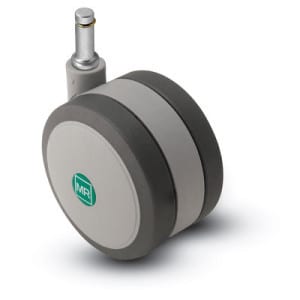 Whether you are looking to fit casters to a piece of furniture, have built a cabinet that you want make mobile, or need replace casters that are worn out on an otherwise good piece of furniture you likely have some questions as to which type of casters will do the job best. Douglas Equipment is here to help!
Whether you are looking to fit casters to a piece of furniture, have built a cabinet that you want make mobile, or need replace casters that are worn out on an otherwise good piece of furniture you likely have some questions as to which type of casters will do the job best. Douglas Equipment is here to help!
We’ve been in the business of quality casters and material handling equipment since 1955, which means we have almost 60 years experience helping people like you to choose the right casters for their unique needs. We are happy to help you with any questions you may have, and we are confident that our dedicated service team can help you find the right type of caster at a price that is affordable. Here are a few things to think about when you are trying to select the right type of caster for the job at hand:
What type of caster application will you be using?
You may think it is an unimportant question, but what will your casters be installed on? You may think buying casters for a simple cart wouldn’t require much thought, but carts come in many sizes with many applications. What is the maximum weight you will want to move on your cart and how many casters will you have on the cart to spread the load? This will help determine the minimum load capacity needed per caster.
Will the cart move in a straight line, or do you need the casters to swivel in order to turn the cart? Do you need brakes to stop the swivel or to hold the cart from moving once in position? While this is an important question to answer, it is only the start of what you need to consider when selecting the right type of caster for the job at hand.
How will your casters be mounted to your equipment?
A simple question, but remember there are several methods that you can use to attach a caster to a cart. Will you be using a mounting plate to attach the casters under the cart with screws or bolts, or will you be using a stem mount? Will the stem mount caster be threaded in, or will it be a press fit? The mounting choice for your casters will also help decide what type of caster is needed.
What type of conditions will the casters be used in?
The simplest part of this question would be the flooring type; is it smooth or rough, hard or soft? In general you will want to choose casters that are the opposite to the flooring type you have; so you’d want soft wheeled casters on hard floors and hard wheeled casters on soft floors. Steel wheels are also good for a smooth floor.
In addition to this, you’ll also want to know if you need casters that can resist heat, cold or chemicals. A performa rubber or phenolic resin wheel is good for extreme temperature fluctuations. By understanding the conditions your casters will need to survive, you will be able to find the right caster for the job at hand.
What wheels do you need for the casters?
This has already been hinted at above, but the wheels of the casters can be made of many different materials for many different uses. If you want wheels for hot and cold extremes then the performa rubber or phenolic resin wheels mentioned above are certainly materials to consider. If you want wheels for a carpeted floor you will want to consider a wheel of hard synthetic polyolefin, nylon or urethane. For tiled floor, a wheel tread made of rubber, polypropylene or urethane should be on your list.
Another consideration when thinking about wheels is how easily you want the wheel to roll and if you need to add a brake to prevent rolling when the unit is in place. Casters have different bearing designs including roller bearings or ball bearings, different raceways in terms of materials and hardness, as well as if there is grease and if the grease needs to be replaced during the life of the casters.
As for brakes, many different varieties also exist here; compression brakes that stop the caster when a load is applied, decompression brakes that hold the caster in place when weight is removed, tread locks brakes that hold onto the wheel tread, total lock brakes that lock the swivel and wheel of the caster or a direction lock brake that only locks the swivel. Knowing what you will use your wheels for will help to make the decision of which type to use and how they should be locked if necessary.
When You Are Ready to Find Out More, Give Douglas Equipment a Call
We can help you sort through all your questions and recommend the best caster for the task you have. Helping you pick the right type of caster for the job at hand is what we do. Our trained service specialists have the product knowledge to help you identify the caster that you need, so contact us today to get started!




